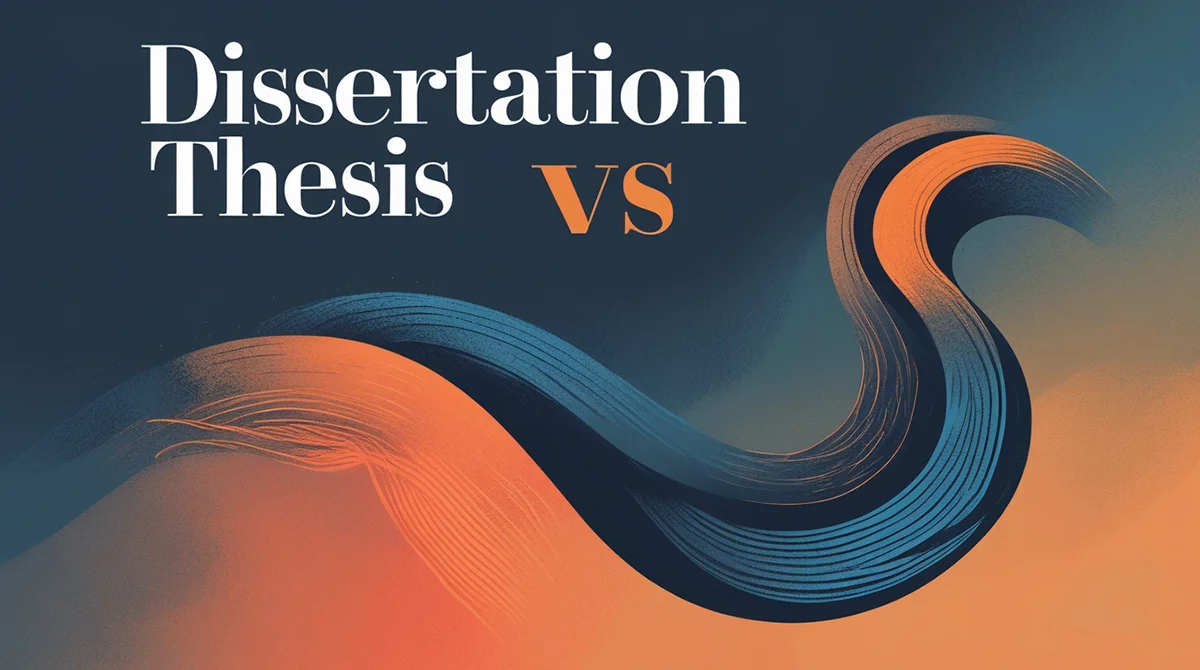At the tertiary level of learning, the terms “thesis” and “dissertation” are interchanged. Most of the students, particularly those from the UK, are left puzzled about what the differences between the two are and how they will impact their learning. Although both are significant research assignments, it is important to know their differences to succeed in your studies. This essay will be a step-by-step explanation of what differentiates a thesis from a dissertation and why they matter, along with advice on how to approach both with confidence. For all this students should rely on assignment help.

The Basics: What is a Thesis?
A thesis is generally a paper that is submitted by a student in order to fulfill the requirements of the master’s degree. A thesis is an extended essay with original research or extensive study of a single subject. A thesis should provide new information on the subject through thorough criticism and review of the existing work.
Key Features of a Thesis:
- Length: A thesis is shorter than a dissertation and usually 10,000 to 20,000 words depending on the subject.
- Scope: It resolves a particular research question or hypothesis and offers an extensive review of research studies and literature on the same.
- Research: The thesis is to incorporate lots of research but not excessively creative like a dissertation. It is to establish that the student can carry out critical analysis and synthesis.
- Purpose: The major purpose of the thesis is to ensure that the student understands some aspect of the subject, his ability to conduct research, and his competence to present such research in clear language.
What is a Dissertation?
But a dissertation is a very lengthy research in order to be able to gain a PhD or even at times a master’s. Dissertations are stand-alone research as well as have the goal of presenting some sort of new contribution to the study field, normally on technically and sophisticated issues as opposed to a thesis.
Key notable things about a Dissertation
- Length: A dissertation will typically be longer than a thesis, between 15,000 and 100,000 words and beyond, depending on organization and topic.
- Scope: Dissertations would necessarily be wider in scope and even sometimes delineate a subject so comprehensively. Dissertations contain new research and, in some instances, large quantities of data collection, analysis, and documentation.
- Research: A dissertation is meant to produce new information, which will ultimately find some use for practice or research at some future date. Research methodology will be longer and more sophisticated than in a thesis.
- Purpose: In order to be primary, the primary purpose of a dissertation is to demonstrate that the student can conduct worthwhile research independently and produce new information in his/her area.
Why the Difference Matters?
You might ask yourself if it’s some kind of mind game that is verbal and which you can learn to be able to tell a dissertation from a thesis—something that you already understand can be of practical use in terms of how you go about your research and writing assignments. These are just some of the reasons that you should know about the difference:
1. Academic Expectations
Your scholarly program will vary in depth and intensity of novelty between a thesis and a dissertation. While specialization and intense analysis may form part of the thesis, a dissertation extends to the creation of new knowledge. For a doctorate, your dissertation must be high in the degree of novelty at this level.
2. Investment of Time and Effort
A thesis will be a concise piece of work compared to a dissertation. You must be able to manage your time well and question yourself if you are prepared to conduct such a lengthy research work. You must keep this difference in mind so that you can work accordingly.
3. Research Skills
Both thesis and dissertation are independent research, but the research of dissertation is more complex. Dissertation refers to the data collection process using improved research methodologies and deriving conclusions that have broader implications for the academic community as a whole.
4. Career Implications
For the majority of situations, clearing a dissertation is necessary for a career in research or as a professor. For others who wish to engage in professional career activities involving areas of exact information regarding topics and not necessarily original research work, a thesis would be adequate.
How to Write a Thesis?
A thesis is a great work but can be done if one does it in a flawless manner. Just remember these steps and you will be able to do your thesis in a good manner:
1. Select a Niche Topic
Begin by selecting a very specific theme that you have passion for and in your area of thesis. Do not select a very wide topic since this will become an issue when you will need to limit the research question.
2. Have a Well-Defined Research Question
Having a good thesis is having a very good research question. Your research will attempt to give an answer to the question through diligent secondary as well as primary data analysis.
3. Detailed Research
Collecting a number of sources of types, i.e., books, journals, and other peer-review articles, will be needed from your side. Your research must turn descriptive in nature with turning specific while explaining your research topic.
4. Write Briefly and Concisely
As you write your thesis, make sure you organize your arguments in the proper sequence and logically. A thesis requires that you include an introduction, literature review, methodology, results, and conclusion.
5. Proofreading and Editing
Once you have finished writing your thesis, proofread it also and fix some of the errors. This will help you make sure your work is error-free and of good scholastic style and format.
How to Write a Dissertation?
It is more difficult to write a dissertation, but listen and begin with a good plan and you’ll be fine. Some of the items you can research here are:
1. Select an Original Topic
A dissertation involves selecting a topic of your choice but with something new for the world of research. Your dissertation must fill the gap in previous research or offer a solution to an existing issue in the form of new thinking.
2. Research Planning
Since a dissertation is very wide in subject, there must be an appropriate research plan. Your plan must contain your objectives, research process, timeline, and milestones.
3. Collect Primary Data
You may have to collect primary data in dissertations at times. It may be questionnaires, interviews, experiments, or case studies. Make your research process ethical and reliable.
4. Present Current Literature
While your dissertation is meant to be adding something new to the mix, you must ensure that you are adding to the literature. This will enable you to build on what has already been done and place your research in the broader context of the argument in the broader academic community.
5. Work Closely with Your Supervisor
Your dissertation would require advisory or supervision guidance. Ensure that you meet your advisor/supervisor regularly and receive feed-back regarding your work progress in writing and on research. It will keep you on deadline with deadlines as well as shape your work.
Overcoming Challenges with Assignment Help
Tying and writing a dissertation is scary. Conducting your good research is overwhelming sometimes. There are choices available that can make it slightly less of a nightmare. Assignment help could be a helpful choice to become conscious, enhance your writing, and have your work in academic shape.
Assignment help support experts deliver expert services as far as writing, editing, or even providing research material is concerned. It is possible to discover the intricacies of a dissertation and a thesis with guidance.
Conclusion
The students must be made aware of the biggest differences of a thesis from a dissertation because they have to produce them in applications for advanced degrees. Both require significant research and the capability to reduce and clarify data in a productive order. Both are different in that a dissertation is more severe and longer, and meant to contribute something new to scholarship, while a thesis is a comprehensive reduction of research and literature.
By knowing the distinctions, you’ll be better equipped to manage your time and effort, as well as to meet the specific requirements of each task. Remember that whether working on a thesis or a dissertation, the goal is to demonstrate your academic abilities and contribute meaningfully to your area of study.
If additional assistance with the difficult task is needed, Assignment in Need and other organizations of similar character can be invaluable in assisting you with much-needed advice and guidance. With assistance, there are strong chances you are now strongly positioned to effectively and confidently perform such important university tasks.



